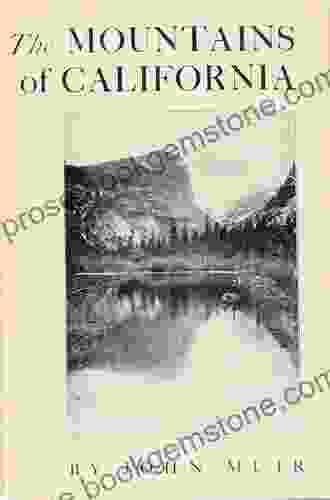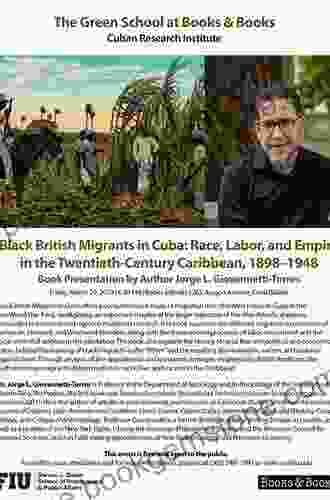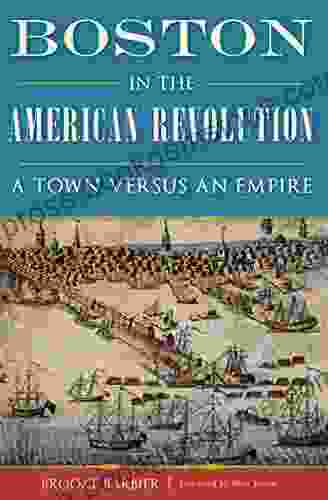Race, Labor, and Empire in the Twentieth Century Caribbean: 1898-1948

The Caribbean region has a long and complex history of colonialism, imperialism, and racial oppression. The arrival of European colonizers in the 15th century led to the establishment of a plantation economy based on the forced labor of African slaves. This system of racial exploitation persisted for centuries, and it had a profound impact on the development of Caribbean societies.
5 out of 5
| Language | : | English |
| File size | : | 4040 KB |
| Text-to-Speech | : | Enabled |
| Screen Reader | : | Supported |
| Enhanced typesetting | : | Enabled |
| Word Wise | : | Enabled |
| Print length | : | 318 pages |
In the late 19th and early 20th centuries, the Caribbean region underwent a period of significant economic and social change. The rise of the sugar, banana, and oil industries led to an influx of foreign capital and labor. This period also saw the emergence of new racial ideologies, which justified the continued exploitation of Caribbean people.
The United States' occupation of Puerto Rico in 1898 and the British colonization of the Lesser Antilles had a profound impact on the region. The US imposed a system of racial segregation in Puerto Rico, and it used the island as a base for its military and economic expansion in the Caribbean. The British, meanwhile, continued to exploit the labor of Caribbean people on their plantations and mines.
The experiences of Caribbean people during this period were shaped by the complex interplay of race, labor, and empire. Racial ideologies were used to justify the continued exploitation of Caribbean people, and labor practices were designed to maintain a cheap and docile workforce. The imperial powers, meanwhile, used their control over the region to extract resources and profits.
The Caribbean region was a site of intense racial conflict during the early 20th century. Race riots broke out in several islands, and the Garvey movement, which advocated for the self-determination of African people, gained widespread support. These events reflected the growing frustration and anger of Caribbean people over their continued exploitation.
The period from 1898 to 1948 was a watershed moment in the history of the Caribbean region. The experiences of Caribbean people during this period helped to shape the development of the modern world. The legacy of race, labor, and empire continues to shape Caribbean societies today.
Race and Labor in the Caribbean
Race has been a central factor in the history of the Caribbean region. The arrival of European colonizers in the 15th century led to the establishment of a plantation economy based on the forced labor of African slaves. This system of racial exploitation persisted for centuries, and it had a profound impact on the development of Caribbean societies.
In the late 19th and early 20th centuries, the rise of the sugar, banana, and oil industries led to an influx of foreign capital and labor. This period also saw the emergence of new racial ideologies, which justified the continued exploitation of Caribbean people.
The United States' occupation of Puerto Rico in 1898 and the British colonization of the Lesser Antilles had a profound impact on the region. The US imposed a system of racial segregation in Puerto Rico, and it used the island as a base for its military and economic expansion in the Caribbean. The British, meanwhile, continued to exploit the labor of Caribbean people on their plantations and mines.
The experiences of Caribbean people during this period were shaped by the complex interplay of race, labor, and empire. Racial ideologies were used to justify the continued exploitation of Caribbean people, and labor practices were designed to maintain a cheap and docile workforce. The imperial powers, meanwhile, used their control over the region to extract resources and profits.
The Rise of the Labor Movement in the Caribbean
The early 20th century saw the rise of the labor movement in the Caribbean. Workers in the sugar, banana, and oil industries began to organize themselves to demand better wages and working conditions. This movement was led by a new generation of Caribbean leaders, who were inspired by the ideas of socialism and nationalism.
The labor movement in the Caribbean faced significant challenges. The imperial powers were often hostile to organized labor, and they used their control over the region to suppress strikes and other forms of protest. However, the labor movement continued to grow, and it played a key role in the struggle for independence in the Caribbean.
The Legacy of Race, Labor, and Empire in the Caribbean
The period from 1898 to 1948 was a watershed moment in the history of the Caribbean region. The experiences of Caribbean people during this period helped to shape the development of the modern world. The legacy of race, labor, and empire continues to shape Caribbean societies today.
The Caribbean region is a diverse and vibrant region with a rich history and culture. However, the legacy of race, labor, and empire continues to cast a long shadow over the region. The experiences of Caribbean people during the early 20th century are a reminder of the importance of fighting against racial oppression and exploitation.
5 out of 5
| Language | : | English |
| File size | : | 4040 KB |
| Text-to-Speech | : | Enabled |
| Screen Reader | : | Supported |
| Enhanced typesetting | : | Enabled |
| Word Wise | : | Enabled |
| Print length | : | 318 pages |
Do you want to contribute by writing guest posts on this blog?
Please contact us and send us a resume of previous articles that you have written.
 Best Book
Best Book Page Flip
Page Flip Bookshelf
Bookshelf Literary loom
Literary loom Chapter
Chapter Bookish
Bookish PageTurner
PageTurner Bibliophile
Bibliophile Story
Story Inkwell
Inkwell Bookworm
Bookworm Labyrinth
Labyrinth Plot Twist
Plot Twist Prose
Prose Paperback
Paperback Storyteller
Storyteller Sanctuary
Sanctuary Fiction
Fiction Reading
Reading Chronicle
Chronicle Read
Read Mindy Lighthipe
Mindy Lighthipe James N Yamazaki
James N Yamazaki Greg Keyes
Greg Keyes Jake Jackson
Jake Jackson Nate Staniforth
Nate Staniforth Jason Anspach
Jason Anspach Brian C Hailes
Brian C Hailes Elin Hilderbrand
Elin Hilderbrand Thomas S Abler
Thomas S Abler C Shortt
C Shortt Michael Hingson
Michael Hingson Peter Rhee
Peter Rhee S J A Turney
S J A Turney Keisha J
Keisha J Carolyn Schulz
Carolyn Schulz Katie Douglas
Katie Douglas Linda Grant
Linda Grant Edgardo Cozarinsky
Edgardo Cozarinsky Jenny Lawson
Jenny Lawson Carlyn Beccia
Carlyn Beccia C H Duryea
C H Duryea Victor Manibo
Victor Manibo Dave Walsh
Dave Walsh Dana Mahan Jr
Dana Mahan Jr Brendan Keogh
Brendan Keogh Lee Hammond
Lee Hammond Liron Yanconsky
Liron Yanconsky Milo James Fowler
Milo James Fowler Casey Diaz
Casey Diaz David Ryan
David Ryan Yuwanda Black
Yuwanda Black Lucy R Lippard
Lucy R Lippard Kimberlee Yolanda Williams
Kimberlee Yolanda Williams Dean Foster
Dean Foster David Crow
David Crow R Annie Gough
R Annie Gough William Hogarth
William Hogarth Carole Angier
Carole Angier Mark Arnold
Mark Arnold Gail Grant
Gail Grant Bob Elliott
Bob Elliott Carly Murden
Carly Murden Paul Reps
Paul Reps Jennine Capo Crucet
Jennine Capo Crucet Catherine Porter
Catherine Porter Gabriel Weisz Carrington
Gabriel Weisz Carrington Rheni Tauchid
Rheni Tauchid Sara Alm
Sara Alm Kateri Ewing
Kateri Ewing Bruce Spydar
Bruce Spydar Kate Furnivall
Kate Furnivall Marie Arana
Marie Arana Timon Screech
Timon Screech Lacy Crawford
Lacy Crawford Miles J Unger
Miles J Unger Dessy Tsolova
Dessy Tsolova Gary Chandler
Gary Chandler Christy Brown
Christy Brown Craig Anderson
Craig Anderson Virginia Hein
Virginia Hein Peter Cawdron
Peter Cawdron Bradford Bates
Bradford Bates K G Crawford
K G Crawford Brady J Crytzer
Brady J Crytzer Mandy Pattullo
Mandy Pattullo Carolyn Birrell
Carolyn Birrell Nick Caistor
Nick Caistor Drmw
Drmw Lisa Colozza Cocca
Lisa Colozza Cocca Sallust
Sallust Bruce Kennett
Bruce Kennett C J Box
C J Box Brittney C Cooper
Brittney C Cooper Bradford Pearson
Bradford Pearson Dolly Parton
Dolly Parton Carsten Wieland
Carsten Wieland G L Carriger
G L Carriger Keith Mccloskey
Keith Mccloskey Carrie Fisher
Carrie Fisher Mark Allen
Mark Allen Gerald M Kilby
Gerald M Kilby J T Skye
J T Skye Brian D Meeks
Brian D Meeks C T Rwizi
C T Rwizi Whitney Crothers Dilley
Whitney Crothers Dilley James Graham Baker
James Graham Baker William T Vollmann
William T Vollmann Brian Hicks
Brian Hicks Tod Polson
Tod Polson C M Carney
C M Carney Lincoln Cushing
Lincoln Cushing Bryon Macwilliams
Bryon Macwilliams Brooke Barbier
Brooke Barbier Josh Malerman
Josh Malerman Brian Lawrenson
Brian Lawrenson Catherine Gill
Catherine Gill Ednor Therriault
Ednor Therriault Chris Willis
Chris Willis Mateus Batista
Mateus Batista Gary Gibson
Gary Gibson Maria Holderbaum
Maria Holderbaum Tanya Lapointe
Tanya Lapointe Foundation Of Flexographic Technical...
Foundation Of Flexographic Technical... Lidia Bastianich
Lidia Bastianich Laila Ibrahim
Laila Ibrahim D J Conway
D J Conway Sheri S Tepper
Sheri S Tepper Carrol L Henderson
Carrol L Henderson Tom Hayden
Tom Hayden David Gilmore
David Gilmore Caitlyn O Leary
Caitlyn O Leary Eve Laplante
Eve Laplante Robert Littell
Robert Littell Jesse Leon
Jesse Leon Rachel Felder
Rachel Felder Gene H Bell Villada
Gene H Bell Villada Leigh Ann Gale
Leigh Ann Gale Brontez Purnell
Brontez Purnell Daniel J Sharfstein
Daniel J Sharfstein Claudia Romo Edelman
Claudia Romo Edelman Jared Blando
Jared Blando Carl Weber
Carl Weber Carrie Cariello
Carrie Cariello Victoria Smith
Victoria Smith Robin Hobb
Robin Hobb Buie Harwood
Buie Harwood Karl Fulves
Karl Fulves Kirsten Pai Buick
Kirsten Pai Buick June Foray
June Foray K Wan
K Wan Tim Jeal
Tim Jeal Matt Brown
Matt Brown Parshwika Bhandari
Parshwika Bhandari Dwayne Walker
Dwayne Walker Mikhail Uspensky
Mikhail Uspensky Frederick Joseph
Frederick Joseph Jay Wolf
Jay Wolf Gretchen Rubin
Gretchen Rubin James O Reilly
James O Reilly Dave Pelzer
Dave Pelzer George R R Martin
George R R Martin Peter Mutabazi
Peter Mutabazi Tim Hannigan
Tim Hannigan Renee Rose
Renee Rose Sabeeha Rehman
Sabeeha Rehman Eric Bravo
Eric Bravo Ken Lozito
Ken Lozito Parvati Sharma
Parvati Sharma Tanith Lee
Tanith Lee Russell Maddicks
Russell Maddicks Susan Hill
Susan Hill Caroline Scott
Caroline Scott Mynor Schult
Mynor Schult Jennifer Niven
Jennifer Niven Kelly Sheldrick
Kelly Sheldrick Devon C Ford
Devon C Ford Mark Greenside
Mark Greenside Jack L Roberts
Jack L Roberts Scott Hughey
Scott Hughey Rick Cheadle
Rick Cheadle Jack Vance
Jack Vance Jan Grue
Jan Grue Jennifer Smith Turner
Jennifer Smith Turner Kelsey Oseid
Kelsey Oseid Kevin Winkler
Kevin Winkler Pyae Moe Thet War
Pyae Moe Thet War Sonia Cheadle
Sonia Cheadle Inc Complex Media
Inc Complex Media Connie Fleenor
Connie Fleenor Stephen Kohler
Stephen Kohler Kris Timken
Kris Timken James Steffen
James Steffen Robert Lamouroux
Robert Lamouroux Erik Stafford
Erik Stafford Cheryl Burke
Cheryl Burke Butch Hartman
Butch Hartman Mineko Iwasaki
Mineko Iwasaki Carole S Kessner
Carole S Kessner Cathy Johnson
Cathy Johnson Burton Bernstein
Burton Bernstein David H Levy
David H Levy William Matson
William Matson Brian Wright Mcleod
Brian Wright Mcleod Brian Borgford
Brian Borgford Mark Dawson
Mark Dawson Brenda Ferguson Hodges
Brenda Ferguson Hodges Sandy Allison
Sandy Allison Daphne Jenkins Sheldrick
Daphne Jenkins Sheldrick Roberto Sandorez
Roberto Sandorez Nikqua
Nikqua S K Dunstall
S K Dunstall Jenny Volvovski
Jenny Volvovski Michael Moon
Michael Moon Brando Skyhorse
Brando Skyhorse John Logan
John Logan Kellie Stafford
Kellie Stafford Delaney Diamond
Delaney Diamond Sarah Garland
Sarah Garland Charles Kenney
Charles Kenney Mary C Olson
Mary C Olson Joel Shepherd
Joel Shepherd C S Leaf
C S Leaf Gretchen M Baker
Gretchen M Baker J F Martel
J F Martel Carol Wood
Carol Wood Tamar Arslanian
Tamar Arslanian Bryce W James
Bryce W James Dennis Tupicoff
Dennis Tupicoff Catherine Craft
Catherine Craft Brian Broome
Brian Broome Caren Schnur Neile
Caren Schnur Neile Melissa R Klapper
Melissa R Klapper Reyna Grande
Reyna Grande Rachael Lynn
Rachael Lynn Carol A Krejci
Carol A Krejci John Muir
John Muir Scott David Plumlee
Scott David Plumlee Eric Grzymkowski
Eric Grzymkowski Vanessa Riley
Vanessa Riley Elsa Sjunneson
Elsa Sjunneson Dan Moren
Dan Moren Paul Clammer
Paul Clammer Jasmine Tritten Llc
Jasmine Tritten Llc Wilder Page
Wilder Page Iris Scott
Iris Scott Tiffanie Didonato
Tiffanie Didonato Brit Bennett
Brit Bennett Polly Evans
Polly Evans Capt Ron Nielsen
Capt Ron Nielsen Breeze Holding The Moon
Breeze Holding The Moon Cale Plamann
Cale Plamann Vladimir Sorokin
Vladimir Sorokin Cain Carroll
Cain Carroll Candy Moore
Candy Moore Bwwm Love
Bwwm Love Mira Jacob
Mira Jacob Justin Spizman
Justin Spizman Carolina Rose
Carolina Rose Michael Jacobs
Michael Jacobs Brandi Rarus
Brandi Rarus Johnnie Gentle
Johnnie Gentle C B Griesbach
C B Griesbach Carolyn Porter
Carolyn Porter Michelle Kuo
Michelle Kuo Tao Wong
Tao Wong Timothy Zahn
Timothy Zahn Brian Herbert
Brian Herbert Robbie Freeman Shugart
Robbie Freeman Shugart Murry E Page
Murry E Page Carolyn Brown
Carolyn Brown D L Young
D L Young Haytham Al Fiqi
Haytham Al Fiqi Janice Oberding
Janice Oberding Bridget Quinn
Bridget Quinn Lauren Kessler
Lauren Kessler Brien Foerster
Brien Foerster Kimi Cunningham Grant
Kimi Cunningham Grant Catherine Kerrison
Catherine Kerrison Maturin Murray Ballou
Maturin Murray Ballou Linda Przybyszewski
Linda Przybyszewski Robert Egan
Robert Egan James Tate Hill
James Tate Hill Tasha Black
Tasha Black Carole Massey
Carole Massey Noell K Wolfgram Evans
Noell K Wolfgram Evans Nate Crowley
Nate Crowley Rosalind Rosenberg
Rosalind Rosenberg Mara Jaye
Mara Jaye Emiko Ohnuki Tierney
Emiko Ohnuki Tierney Robin Capon
Robin Capon Janet Whittle
Janet Whittle Burst Books
Burst Books Walter Mosley
Walter Mosley Zitkala Sa
Zitkala Sa Donna Digiuseppe
Donna Digiuseppe Marji Hill
Marji Hill Toni Braxton
Toni Braxton Francene Hart
Francene Hart Bev Sellars
Bev Sellars Suzette D Harrison
Suzette D Harrison Luca Somigli
Luca Somigli J C Moore
J C Moore J R Grey
J R Grey Mike Jack Stoumbos
Mike Jack Stoumbos Joe Ide
Joe Ide Niall Williams
Niall Williams Brian Dickinson
Brian Dickinson Veronica Lawlor
Veronica Lawlor Charles Earl Bradbury
Charles Earl Bradbury Peter Moruzzi
Peter Moruzzi Vrasidas Karalis
Vrasidas Karalis Eddie Jaku
Eddie Jaku Heriberto Padilla
Heriberto Padilla Jennifer Julie Miller
Jennifer Julie Miller Brendan Nuenfeldt
Brendan Nuenfeldt Joe R Frinzi
Joe R Frinzi Frances Mayes
Frances Mayes Remco Ensel
Remco Ensel Tony Bartelme
Tony Bartelme Lyn Wilkerson
Lyn Wilkerson Tj Silverlake
Tj Silverlake Carol Bolt
Carol Bolt Carlos Francisco Jackson
Carlos Francisco Jackson Mark Lewis
Mark Lewis Charlene Mciver
Charlene Mciver Catherynne M Valente
Catherynne M Valente S C Eston
S C Eston Camille Laurens
Camille Laurens Jillian Vose
Jillian Vose Rabbi Lynnda Targan
Rabbi Lynnda Targan Dianne Hales
Dianne Hales Caseen Gaines
Caseen Gaines Stephanie Elizondo Griest
Stephanie Elizondo Griest Kai Kupferschmidt
Kai Kupferschmidt Bruce Bradley
Bruce Bradley Sven Lindqvist
Sven Lindqvist Tananarive Due
Tananarive Due David Kalat
David Kalat Dawn Prince Hughes
Dawn Prince Hughes Brad Leone
Brad Leone The Editors Of New York Magazine
The Editors Of New York Magazine D B Goodin
D B Goodin Booker T Washington
Booker T Washington John Wagner
John Wagner Scott Finazzo
Scott Finazzo Bruce Ansley
Bruce Ansley Carla L Peterson
Carla L Peterson Kimolisa Mings
Kimolisa Mings John Waters
John Waters Mark Leonard
Mark Leonard Perry Buck
Perry Buck Brian Ladd
Brian Ladd Maud Guilfoyle
Maud Guilfoyle Sudhir Hazareesingh
Sudhir Hazareesingh Brenda Jackson
Brenda Jackson Stephen Mertz
Stephen Mertz Sharon C Cooper
Sharon C Cooper Brandon Webb
Brandon Webb Wayne Mardle
Wayne Mardle Mia Black
Mia Black Sara Rudin
Sara Rudin Marcia Iwatate
Marcia Iwatate Jenifer Ringer
Jenifer Ringer Bryan Miles
Bryan Miles Lily Koppel
Lily Koppel Marceline Smith
Marceline Smith Constantin Step
Constantin Step Carl Hiaasen
Carl Hiaasen C V Walter
C V Walter David Gerrold
David Gerrold Robert Noble Graham
Robert Noble Graham Brian Evans
Brian Evans Kathleen Mccormack
Kathleen Mccormack Scott D Smith
Scott D Smith Emiko Yamamoto
Emiko Yamamoto Niobia Bryant
Niobia Bryant Graham Mackintosh
Graham Mackintosh Yolanda Hadid
Yolanda Hadid Carol Belanger Grafton
Carol Belanger Grafton Tara M Stringfellow
Tara M Stringfellow Carolyn Han
Carolyn Han Sarah Jane Downing
Sarah Jane Downing Leo Buijs
Leo Buijs Susan Kennedy
Susan Kennedy Brette Sember
Brette Sember C White Foss
C White Foss Clayton Graham
Clayton Graham Ella Maven
Ella Maven Dl Acken
Dl Acken Suzanne Woods Fisher
Suzanne Woods Fisher Bruce Baird
Bruce Baird Peter Razor
Peter Razor Carmen Sheldon
Carmen Sheldon Elise Young
Elise Young John Clites
John Clites Mike Gayle
Mike Gayle C Carr
C Carr Ilhan Omar
Ilhan Omar Lonely Planet
Lonely Planet Ernesto Mallo
Ernesto Mallo Jerry Remy
Jerry Remy Eric Henze
Eric Henze Caroline Johnson
Caroline Johnson Shane Lochlann Black
Shane Lochlann Black Guy Haley
Guy Haley John Campbell
John Campbell Tosha Lavette
Tosha Lavette Darin Martineau
Darin Martineau Margarida Araya
Margarida Araya N K Jemisin
N K Jemisin Vaughn Heppner
Vaughn Heppner Mary Stuart
Mary Stuart Kevina Hopkins
Kevina Hopkins M R Forbes
M R Forbes Maya Jasanoff
Maya Jasanoff Cal Patch
Cal Patch Mike Watt
Mike Watt Michelle Burford
Michelle Burford C J Cherryh
C J Cherryh D Dauphinee
D Dauphinee Camilla Townsend
Camilla Townsend Vicki Zoradi
Vicki Zoradi Lincoln Child
Lincoln Child David Steffen
David Steffen Stuart Kendall
Stuart Kendall Deborah Ball
Deborah Ball Bob Able
Bob Able Marcos Enrique Ruiz Rivero Ii Aviel
Marcos Enrique Ruiz Rivero Ii Aviel Relaxed Venues
Relaxed Venues Carolyn J Brown
Carolyn J Brown Bridget Conor
Bridget Conor Kate Schelter
Kate Schelter Chronicle Books
Chronicle Books Oliver La Farge
Oliver La Farge Jason Diamond
Jason Diamond Kamal Saleem
Kamal Saleem Brian Harker
Brian Harker Karyn Langhorne Folan
Karyn Langhorne Folan Simon Loxley
Simon Loxley Isa Milman
Isa Milman Pete Dunne
Pete Dunne Ramin Zahed
Ramin Zahed Paul E Fallon
Paul E Fallon Brian Seidman
Brian Seidman Norberto Chaves
Norberto Chaves Bruce Sutherland
Bruce Sutherland Emily Sturgill
Emily Sturgill Brittney Brooke
Brittney Brooke Caterine Milinaire
Caterine Milinaire Janice Seto
Janice Seto Jane Urquhart
Jane Urquhart Hugh Leach
Hugh Leach Brittany K Barnett
Brittany K Barnett Jennie Batchelor
Jennie Batchelor Michael Lent
Michael Lent Caitlin Starling
Caitlin Starling Eufrasia Gagliardo
Eufrasia Gagliardo Olivia De Havilland
Olivia De Havilland Karma Waltonen
Karma Waltonen Olivia Riley
Olivia Riley Scaachi Koul
Scaachi Koul Yumiko Alexander
Yumiko Alexander Brian Ashcraft
Brian Ashcraft Rafael De Grenade
Rafael De Grenade Jeffrey Ross
Jeffrey Ross Brian Smith
Brian Smith Liane Grunberg Wakabayashi
Liane Grunberg Wakabayashi Danielle Bernstein
Danielle Bernstein James Mcbride
James Mcbride Caroline Weber
Caroline Weber Judith Heumann
Judith Heumann Brooke Rundle
Brooke Rundle Cat Seto
Cat Seto Maurice Broaddus
Maurice Broaddus Laylah Roberts
Laylah Roberts Carole Zucker
Carole Zucker Dan X Solo
Dan X Solo Carmen Reid
Carmen Reid John Berger
John Berger Ben Box
Ben Box Gaston Migeon
Gaston Migeon Caroline Knapp
Caroline Knapp Sarah Spencer
Sarah Spencer Byron Comstock
Byron Comstock Richard Mayhew
Richard Mayhew Daniel Arenson
Daniel Arenson Madeleine L Engle
Madeleine L Engle Sister Dang Nghiem
Sister Dang Nghiem Terry Galloway
Terry Galloway Eric Walters
Eric Walters Mario Puzo
Mario Puzo Caroline Self
Caroline Self Michael Frary
Michael Frary Bruce T Batchelor
Bruce T Batchelor Carl E Schorske
Carl E Schorske Carrie Summers
Carrie Summers Tom Bergeron
Tom Bergeron Taniece
Taniece Toni Bentley
Toni Bentley Mz Creates
Mz Creates Robert Barr Smith
Robert Barr Smith Brian C Baer
Brian C Baer Pearl S Buck
Pearl S Buck Michael Bierut
Michael Bierut Didier Ghez
Didier Ghez Carol Miller
Carol Miller Magnus Reid
Magnus Reid David Sayers
David Sayers Joe Palermo
Joe Palermo Tom Wolfe
Tom Wolfe Mark Wandrey
Mark Wandrey Paul Chiasson
Paul Chiasson Carol Berry
Carol Berry Thomas Kinkade
Thomas Kinkade Brooke Hayward
Brooke Hayward C Gockel
C Gockel Darla Mayberry
Darla Mayberry Michael Sragow
Michael Sragow Mike Lyon
Mike Lyon Camilla Erickson
Camilla Erickson Leanne Howe
Leanne Howe Herbie J Pilato
Herbie J Pilato Eric Shanes
Eric Shanes Marilyn Ann Moss
Marilyn Ann Moss Marge Piercy
Marge Piercy J A Fielding
J A Fielding Brian Dougherty
Brian Dougherty Peggy Dean
Peggy Dean Kate Fullagar
Kate Fullagar Rodolphe Lasnes
Rodolphe Lasnes Jill Winch
Jill Winch Shaku Atre
Shaku Atre Donald Keene
Donald Keene Troy Howarth
Troy Howarth Carter Hasegawa
Carter Hasegawa Bruce Schoenfeld
Bruce Schoenfeld Howard Beckerman
Howard Beckerman Briar Levit
Briar Levit Jonathan Raban
Jonathan Raban Cassie Dandridge Selleck
Cassie Dandridge Selleck George Alec Effinger
George Alec Effinger Kay Bratt
Kay Bratt Paul Smith
Paul Smith Jacques Vankirk
Jacques Vankirk Julia Sherman
Julia Sherman Vladimir Geroimenko
Vladimir Geroimenko Bell Hooks
Bell Hooks Shaun King
Shaun King David L Sloan
David L Sloan Griff Hosker
Griff Hosker Gerald S Strober
Gerald S Strober Elayne Silva Reyna
Elayne Silva Reyna Tad Crawford
Tad Crawford Sterling Edwards
Sterling Edwards Brandon Massey
Brandon Massey Bill Plympton
Bill Plympton Joshua Slocum
Joshua Slocum Carole Robson
Carole Robson Meena Alexander
Meena Alexander Kelly Kordes Anton
Kelly Kordes Anton H Peter Alesso
H Peter Alesso Cathie Ruggie Saunders
Cathie Ruggie Saunders Max Vance
Max Vance Robert L Forward
Robert L Forward Ems Publishing
Ems Publishing Zora Neale Hurston
Zora Neale Hurston Howard Schultz
Howard Schultz Sean Adams
Sean Adams Nicolas Rothwell
Nicolas Rothwell Diana Somerville
Diana Somerville Tom Segev
Tom Segev Brandon Q Morris
Brandon Q Morris Mimi Robinson
Mimi Robinson Russell Harris
Russell Harris Camelia Elias
Camelia Elias Joan See
Joan See Terrence K Williams
Terrence K Williams Lynn Gilbert
Lynn Gilbert W E B Du Bois
W E B Du Bois Greater Than A Tourist
Greater Than A Tourist Lisa Fenn
Lisa Fenn Kellee Wynne Conrad
Kellee Wynne Conrad Brian Seibert
Brian Seibert Steven V Roberts
Steven V Roberts Shirish Deshpande
Shirish Deshpande Ken Steele
Ken Steele Ian Olio
Ian Olio
Light bulbAdvertise smarter! Our strategic ad space ensures maximum exposure. Reserve your spot today!

 Joseph ConradLove, Loss, and Fiji Time: Exploring the Heartfelt Impact of Transition and...
Joseph ConradLove, Loss, and Fiji Time: Exploring the Heartfelt Impact of Transition and...
 Salman RushdieThe Majestic Mountains of California: An Exploration of John Muir's Enduring...
Salman RushdieThe Majestic Mountains of California: An Exploration of John Muir's Enduring... Bill GrantFollow ·6.4k
Bill GrantFollow ·6.4k Duane KellyFollow ·8.6k
Duane KellyFollow ·8.6k Roy BellFollow ·9.5k
Roy BellFollow ·9.5k Jean BlairFollow ·2k
Jean BlairFollow ·2k Herman MelvilleFollow ·19.4k
Herman MelvilleFollow ·19.4k Orson Scott CardFollow ·15.4k
Orson Scott CardFollow ·15.4k Brett SimmonsFollow ·7.4k
Brett SimmonsFollow ·7.4k George BellFollow ·18.4k
George BellFollow ·18.4k

 Tony Carter
Tony CarterEgypt's Years of Revolution: A Journey Through Tumultuous...
Egypt, a nation steeped in...
5 out of 5
| Language | : | English |
| File size | : | 4040 KB |
| Text-to-Speech | : | Enabled |
| Screen Reader | : | Supported |
| Enhanced typesetting | : | Enabled |
| Word Wise | : | Enabled |
| Print length | : | 318 pages |


















